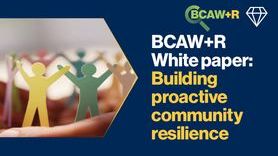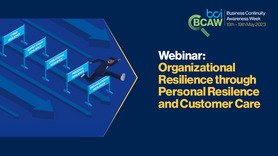Manesh Purshotam – a new committee member for the BCI Southern Africa Chapter

In this spotlight, we speak with Manesh Purshotam, a new committee member for the BCI Southern Africa Chapter.
Could you please tell us about your current role, previous experience, and how you got into Business Continuity (BC)?
I am currently a Manager within KPMG’s Technology Assurance practice, having been with them since I graduated, with a brief stint in the online gambling auditing space. In my earlier days at KPMG, I was placed on a project to implement and establish BC at one of South Africa’s first digital banks under the leadership of Nashikta Angadh, who heads up BC for KPMG South Africa. I immediately felt an urge to continue in the space, given the strategic role it plays within organizations today and considering the ever-changing landscape in which businesses find themselves. Ever since, I have been part of the core BC team at KPMG South Africa.
What do you see as the emerging threats and risks, as well as the trending topics, in your region?
Currently, one of the biggest threats and risks is the potential for continued power outages within South Africa while the power utility attempts to stabilise generating capacity, given the government recent declaring a state of disaster. This has placed several constraints on small and large organizations in their attempts to maintain “business-as-usual”. Therefore, organizations are currently planning for the worst and hoping for the best in this time of uncertainty. Other trending topics include cyber resilience and the global impacts of the war in Ukraine. Last but not least is the sustained impacts from the COVID-19 pandemic, with global supply chains and economies still in the recovery phase.
What has been one of your greatest learning experiences in this sector?
One of my greatest learnings, which has stuck with me from my inception into BC, is that plans are nothing without continuous exercising and testing to ensure that “what is on paper” is “working in practice”. In general terms, I believe that many organizations have been implementing BC with a goal to meet compliance requirements, rather than seeing it as a vehicle to safeguard operations and ensure that mechanisms are not only established but tested! The pandemic and ever-changing risk horizon has placed BC at the very top of the agenda. In addition, this has not only risen in importance on the business level but also in terms of the importance of individual (personal) resilience.
What changes would you like to see in this industry?
I feel that BC needs more integration within other management disciplines to ensure that it is no longer seen as a stand-alone capability, as there are many advantages in taking a holistic approach not only from a top-down perspective but also bottom-up. To add, technology and the reliance on systems and applications has quadrupled with the 4th Industrial Revolution — gaining more momentum than ever. Regarding this, I would like to see more integration between BC and IT Disaster Recovery, as I believe a “handshake” approach will not work moving forward.
What upcoming activities are being planned within the Chapter?
The Chapter is planning on collaborating with various professional bodies throughout the year to bring webinars to the BC audience via virtual and in-person settings. In addition, Business Continuity Awareness Week (BCAW) is coming in May this year, in which we seek to create awareness around key areas of BCM to a diverse group of audiences.
What are you aiming to bring to the Chapter as a committee member?
In working with the committee members, I seek to broaden the scope of our collaboration to different regions and establish working groups on globally trending topics in order to drive our contributions on a global level and enable networking across individuals with different BC skill sets.
Anything else you want to add?
I would like to end by mentioning a quote which has stuck with me over the past few months – “Preparing for tomorrow, begins today!”























